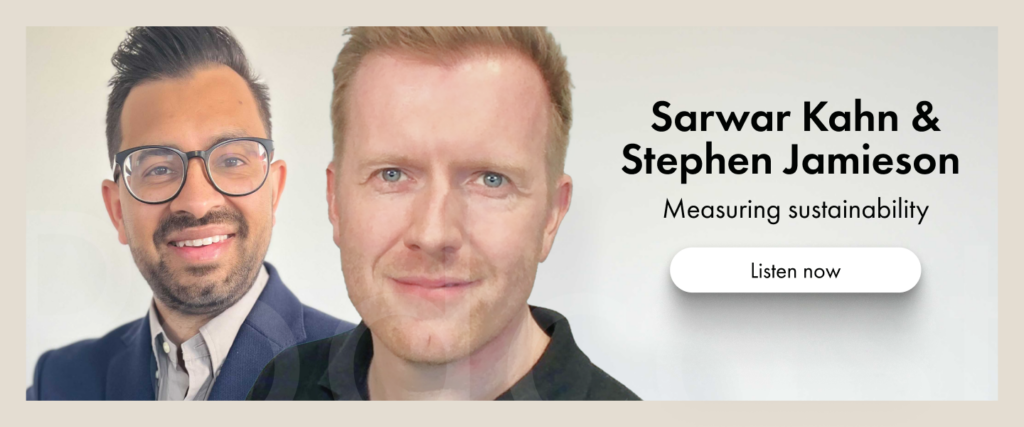
The European Earth Observation agency announced that 2023 was the hottest year on record, with “climate records tumbling like dominoes”. This year has likely followed a similar path.
Progress must accelerate faster. We have a rapidly diminishing ‘carbon budget’ and it’s now or never to take action. But momentum of this kind can’t happen by working alone. While at a business level, sustainability was previously driven by a few ethically motivated organisations, it’s now become a unanimous concern. This is reflected in the evolving boardroom environmental debate. It has shifted from purpose to profit opportunity, and the need to embed better, more circular practices to aid ambitious target setting.
This more holistic approach to tackling the climate crisis is fuelled by a recognition that only reducing operational impact is not enough. Businesses need to consider the entirety of the supply chain, their Scope 3 emissions, from source to production. Only then can organisations implement comprehensive plans that will support the minimisation of waste, boost regeneration and the repurposing of materials. To do this, organisations need to work together to make this shared ambition a reality.
The importance of mitigating scope 3 emissions
Businesses that are just getting to grips with their scope 1 and 2 emissions, direct energy consumption and use, are already falling behind. Reporting upon and reducing these emissions should be table stakes for any business that is committed to protecting the planet. The real progress is made when an organisation understands the importance of mitigating scope 3 emissions – those produced in the supply chain – and why industry collaboration underpins change. These emissions can account for more than 70% of a business’ carbon footprint and so are essential in the move toward net-zero.
While any action that reduces environmental impact should be welcomed, addressing scope 1 and 2 emissions without scope 3 reflects short-term thinking. The former can help organisations reach immediate ESG objectives and boost their environmental credentials, but managing scope 3 will future-proof businesses against more rigorous regulatory demands, attract new investment and ultimately meet net-zero targets. Equally, with consumers more climate-conscious than ever, businesses that are intent on meaningful change will reap the benefits of improved brand reputation and customer loyalty.
However, research shows that few today have a hold over scope 3 emissions. In fact, only 1 in 10 have the ability to track them at all with evidence suggesting that it’s a lack of tools and ability to gather and analyse the right data that is standing in the way of progress.
Where collaboration is addressing measurement shortcomings
When setting environmental goals, many businesses are falling at the first hurdle; they lack the insight that allows them to build climate roadmaps and achieve these aims. And critically so – without being appropriately informed, organisations cannot effectively substantiate their net-zero journey, which can lead to a lack of funding and prioritisation.
For change to be meaningful, there needs to be an understanding of where it is needed most – and that’s where measurement comes into play. To target and transform areas of highest impact, whether that’s sourcing raw materials or shipping products to consumers, businesses need visibility into their supply chains. Then, they can collect, track and share carbon data across their supplier base, allowing them to work closely with business partners to understand their own impact and address it.
BT recently piloted SAP’s Sustainability Data Exchange and this is a key example of the transformative impact measurement and industry collaboration can have for the planet. Through this partnership, BT has a pioneering approach to standardising sustainability reporting and supporting businesses to understand how and where scope 3 emissions are produced. The exchange empowers BT to request and share carbon footprint data with supply chain partners and customers, supporting them to optimise their own operations. For SMEs in particular, this can make a real difference. These businesses often thread together global supply chains but operate without the resource of larger enterprises. Data exchanges allow organisations to make informed environmental decisions and scale sustainably.
With accurate, granular and comparable data, organisations across the supply chain have the insights they need to develop truly comprehensive climate action plans that not only enable them to reduce their emissions, but support the move towards a circular economy.
Gonzalez Byass’ story is another example of how collaboration and a best practice approach to data management can help a company realise its sustainable ambitions. The Spanish wine maker has been focused on reducing plastic for a long time, and its practices have been instrumental in helping it recover and recycle 99% of waste generated. But, Gonzalez Byass also needed to commit to sustainable purchasing throughout the entire value chain. Being able to collect and manage real-time data is key, especially when it comes to regulation requirements.
Working with SAP’s Responsible Design and Production is enabling Gonzalez Byass to accurately calculate fees and taxes in line with all the latest regulations in key markets, optimise its material choices in line with corporate commitments, and significantly reduce risks from unforeseen future challenges.
Ushering the new age of climate leadership
Against the backdrop of a climate crisis, the drive towards a circular economy and net-zero goals has prompted a change in business mindset. Now, leaders are becoming less concerned about acting alone and achieving individual aims, and are instead recognising the benefits of collaboration and how it fuels climate progress as businesses work towards a shared goal. Sharing sustainability data and supporting one another to manage scope 3 emissions is central to this. It not only enhances accountability, but helps to improve decision-making for all businesses involved, no matter the size, by making it easier to identify areas for waste reduction and material recycle or reuse, and act accordingly.

Stephen Jamieson
Stephen Jamieson is now Head of Product Marketing, Sustainability, at SAP, following several years as the company’s Global Head of Circular Economy Solutions.




